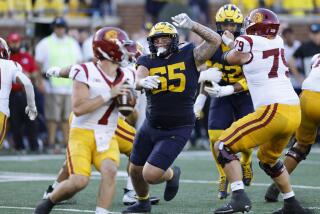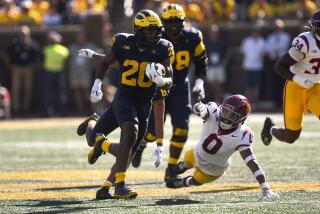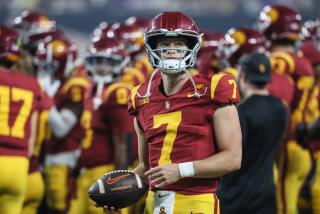Second Effort
- Share via
It was only one play. One carry. One glimpse.
And it caused one big stir along USC’s sideline last Saturday.
Trojan tailback Justin Fargas was not supposed to play against Colorado. A strained hamstring had hobbled the senior transfer from Michigan throughout training camp and forced him to miss the opener against Auburn.
But Fargas, more than most, knows that persistence pays off.
His right leg was broken so severely during his freshman season at Michigan, doctors pondered amputating his foot. Fargas came back from two major leg surgeries and another on his toe to play again for the Wolverines. He transferred to USC in the spring of 2001, served as a tackling dummy on the scout team last fall, then moved up to No. 1 on the depth chart in spring practice.
After overcoming so many obstacles, persuading Kennedy Pola, USC’s running backs coach, to put him in against Colorado was a snap. With just more than six minutes left in the first quarter, Fargas went in, took a hand-off from quarterback Carson Palmer and ran for four yards.
The yardage was insignificant. The milestone it represented was not.
“I’m just happy to get that first carry out of the way,” Fargas said after the Trojans’ 40-3 victory.
Coach Pete Carroll was not as thrilled. He pulled Fargas immediately and ordered equipment personnel to confiscate his helmet.
But Fargas will be a full-fledged member of USC’s suddenly crowded tailback rotation on Saturday, when the 11th-ranked Trojans play No. 25 Kansas State at Manhattan, Kan. USC players and fans, and a national television audience, will finally get an extended look at the 6-foot-1, 210-pound running back who gained 6,357 yards and scored 82 touchdowns in three years at Sherman Oaks Notre Dame High.
“I’m excited to see the guy get his chance,” Carroll said. “He has fought real hard to create this opportunity.”
Fargas, a former state 100-meter track champion, said his goals have changed only slightly during the last four years.
“When I came into college, my dream was to win a championship,” he said. “I wanted to get a degree, I wanted to play in the NFL and if I could get a Heisman Trophy along the way, that was in the plan too.
“I still want to be a great college running back, and I still want to win a championship and graduate and play in the NFL.”
Fargas’ college career is ending at the same place it almost began.
He committed to former Trojan coach John Robinson in 1997, but signed with Michigan after Robinson was fired and replaced by Paul Hackett.
Fargas became a starter a few games into his freshman season in Ann Arbor and gained 120 yards against Northwestern. But on Nov. 14, 1998, after taking a hand-off against Wisconsin, he bulled his way into the line and heard a loud crack as both bones in his lower right leg splintered.
Two days later, surgeons inserted two titanium rods and 12 screws into the leg. Four months after the operation, doctors at Henry Mayo Newhall Memorial Hospital broke the leg again because the bones were not healing properly and inserted two metal plates. Fargas also underwent a procedure to repair tendon damage in his big toe during the summer.
He red-shirted during the 1999 season, working through what a longtime Michigan trainer once described as “the longest recovery from the worst injury I’ve ever seen.”
All the while, Fargas pointed toward a game the next season against UCLA at the Rose Bowl.
“You have to focus on something to get through,” Fargas said. “I didn’t want to believe that I couldn’t make it. I had to come back and prove that I could still play.”
Fargas returned in the 2000 season and had gained 77 yards in 14 carries going into the UCLA game. He envisioned getting 15 to 20 carries against the Bruins and showing hometown fans he could still perform like the high school player who once dived onto a pile of linemen, somersaulted onto his feet and ran for a touchdown.
However, his dream of a storybook homecoming did not come true. Anthony Thomas and Chris Perry were Michigan’s primary ballcarriers. Fargas gained eight yards in four carries and played on special teams in a 23-20 defeat.
After the game, he requested and was granted a switch to safety. By the end of the season, he pined again for a chance to run the ball.
“I wanted to do something bigger,” he said. “At USC, I saw potential of what could be if I came in and put the work in.”
Fargas packed his car before the Wolverines’ 2001 Citrus Bowl game and drove home to Encino. He and his father, Antonio, eventually met with Carroll.
“He told Justin, ‘We can give you the opportunity to write the last act in your career ... with all the drama involved,’ ” recalled Antonio, an actor who played the role of Huggy Bear in the 1970s television series “Starsky & Hutch.”
Fargas underwent another surgery on his toe in March 2001. It did not take long for him to make an impression once he got on the field for training camp last fall. Scout team players usually absorb punishment. Fargas dispensed it.
“Even though he had the scout line and we got to the holes and got to him pretty quick, he didn’t care at all,” defensive tackle Shaun Cody said. “He was breaking tackles and doing everything he could to get out of there.
“He’s a wild-man. It didn’t matter if he was going against NFL players or the scout team. He’s a competitor.”
Fargas gained 139 yards in one scrimmage and 111 in another last spring to win the top spot on the depth chart going into fall practice. His bid to start the opener ended when he strained his right hamstring before the first fall scrimmage.
This week, Fargas will compete for playing time and carries with seniors Malaefou MacKenzie and Sultan McCullough, sophomore Darryl Poston and freshman Hershel Dennis. That quartet helped the Trojans rush for 181 yards against Colorado.
Trojan linemen welcome Fargas back into the mix.
“He is a power runner,” left tackle Jacob Rogers said. “He gives defenses a different look.”
Fargas said he is just happy to be back on the field where he can contribute.
“This is the season I’ll carry with me forever,” he said. “Fans, coaches, and others can say, ‘Oh, that was a bad team.’ Or a good one. They’ll go on and have others. I’m a senior, so this is the one I’ll take with me. I want to make it memorable.”
More to Read
Go beyond the scoreboard
Get the latest on L.A.'s teams in the daily Sports Report newsletter.
You may occasionally receive promotional content from the Los Angeles Times.







